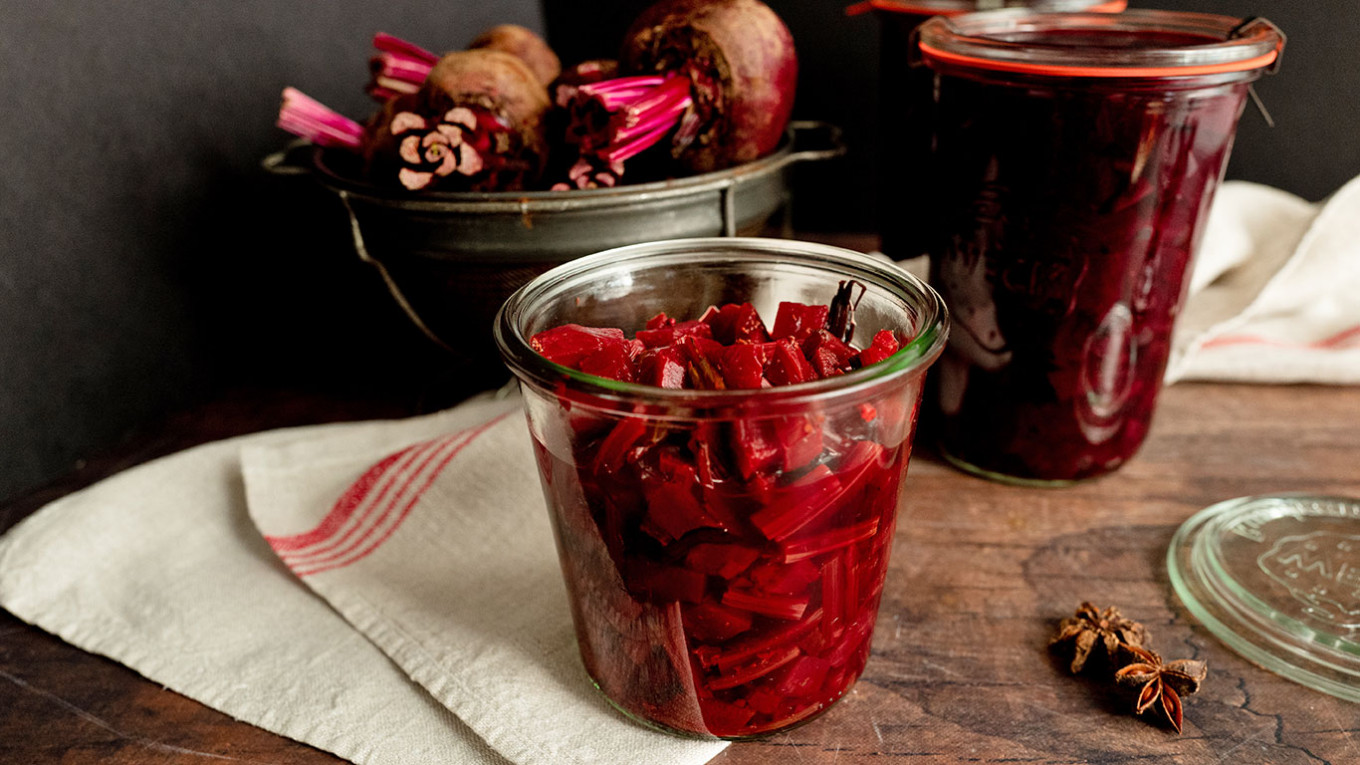Once upon a time, a very long time ago, the Campbell soup people decided to plunge into the beguiling waters of the burgeoning consumer goods industry in Russia. In the expansive manner of global behemoths, Campbell sent out a team of intrepid field agents to the Wild East to learn how they might persuade one of the world’s legendary soup-eating nations to abandon their millennial-old tradition of homemade soup and convert to Campbell’s cheerful line of iconic red and white tins.
Enthusiasm for the project was high in some quarters. The Campbell contingent was lavishly feted by just about everyone who had any kind of interest in seeing lots and lots and lots of Campbell’s soup factories spring up from Kaliningrad to Khabarovsk. The marketing community salivated as if they’d just been served a steaming bowl of borshch on a freezing wintry day in January.
You can say this for Campbell — they did the thing thoroughly, ordering up a plethora of surveys and studies of the Russian market. From these, they developed complicated market research campaigns with clever ideas for free samples, and all kinds of incentives to get Russians to eat tinned soup.
It failed utterly. Well, of course it did.
Within four years, as this paper recorded, the Campbell folks packed up their marketing surveys and went home, admitting that they were incapable of putting even a dent in the Russian passion for homemade soup. Did this surprise anyone? Certainly not. I mean — what were they even thinking?
Russians may have embraced sushi, organic juice, fast food, multi cookers and even chia seeds, but processed soup is simply a bridge too far. No Russian can live without soup in the middle of the day, no matter what the weather, and no Russian worth her (or his) chops would be caught dead using a tin opener to get that soup underway. The good people at Knorr had a better strategy — sell the Russians the means to flavor their broth but attempt no further inroads into the holy of holies, a pot of homemade soup.
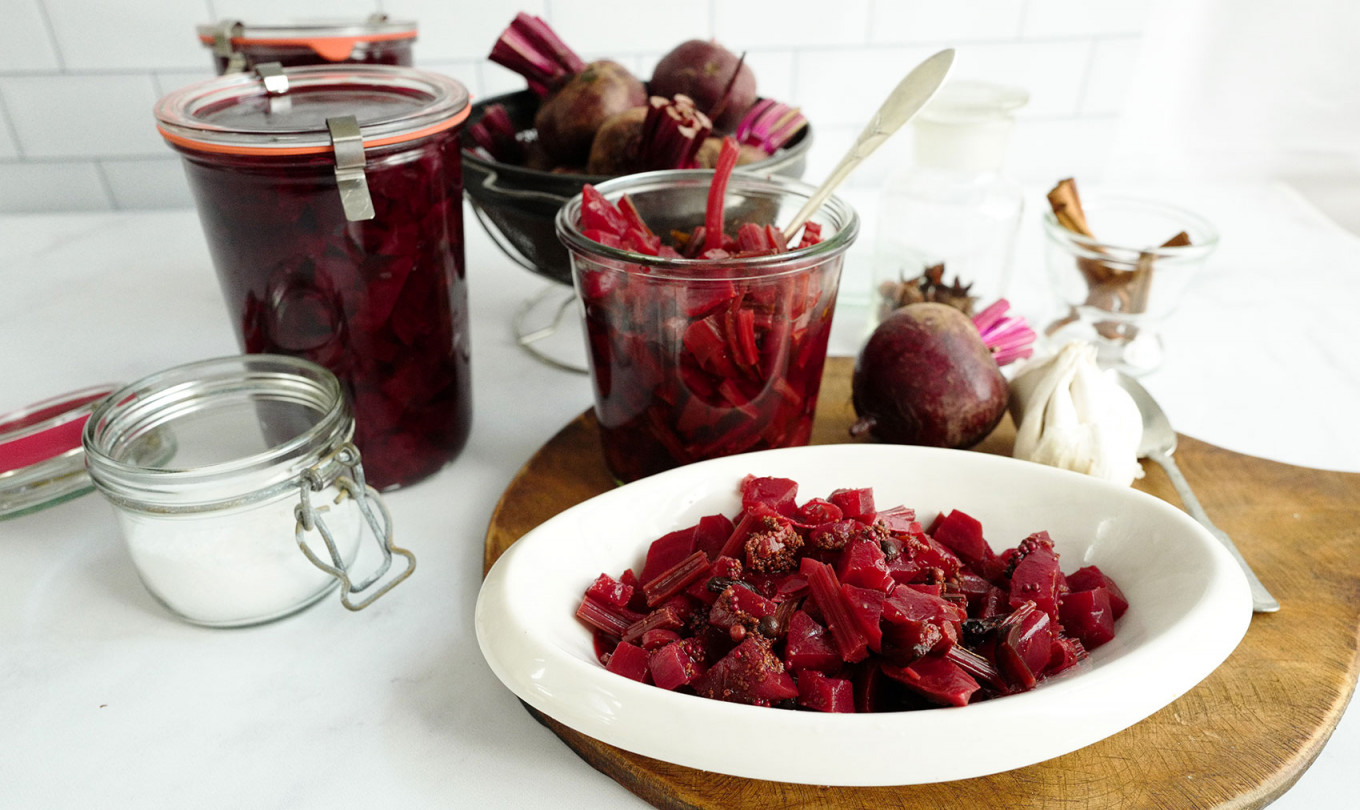
In my exploration of Russia’s magnificent cuisine, I’ve certainly been converted to the sanctity of homemade soup. There is no zealot like a convert, and today the idea of tinned soup strikes me as very disingenuous and slightly suspect. But I employ some canning and preserving tricks to create really great Russian soup.
Each summer, I pickle bushels of beets and their stems in Mason jars with a spicy, tangy brine, and these form the base of an entire winter’s worth of spectacular borshch. Not only do the pickled beets provide the deep purple color that is the calling card of Eastern Europe’s beloved beetroot soup, they also inject rasol into the mix, giving the borshch its essential, mouth-puckeringly sour tang. With a jar of pickled beets, a few lamb shanks or beef short ribs and some carrots and parsnips, you are well on your way to a fabulous pot of homemade borshch.
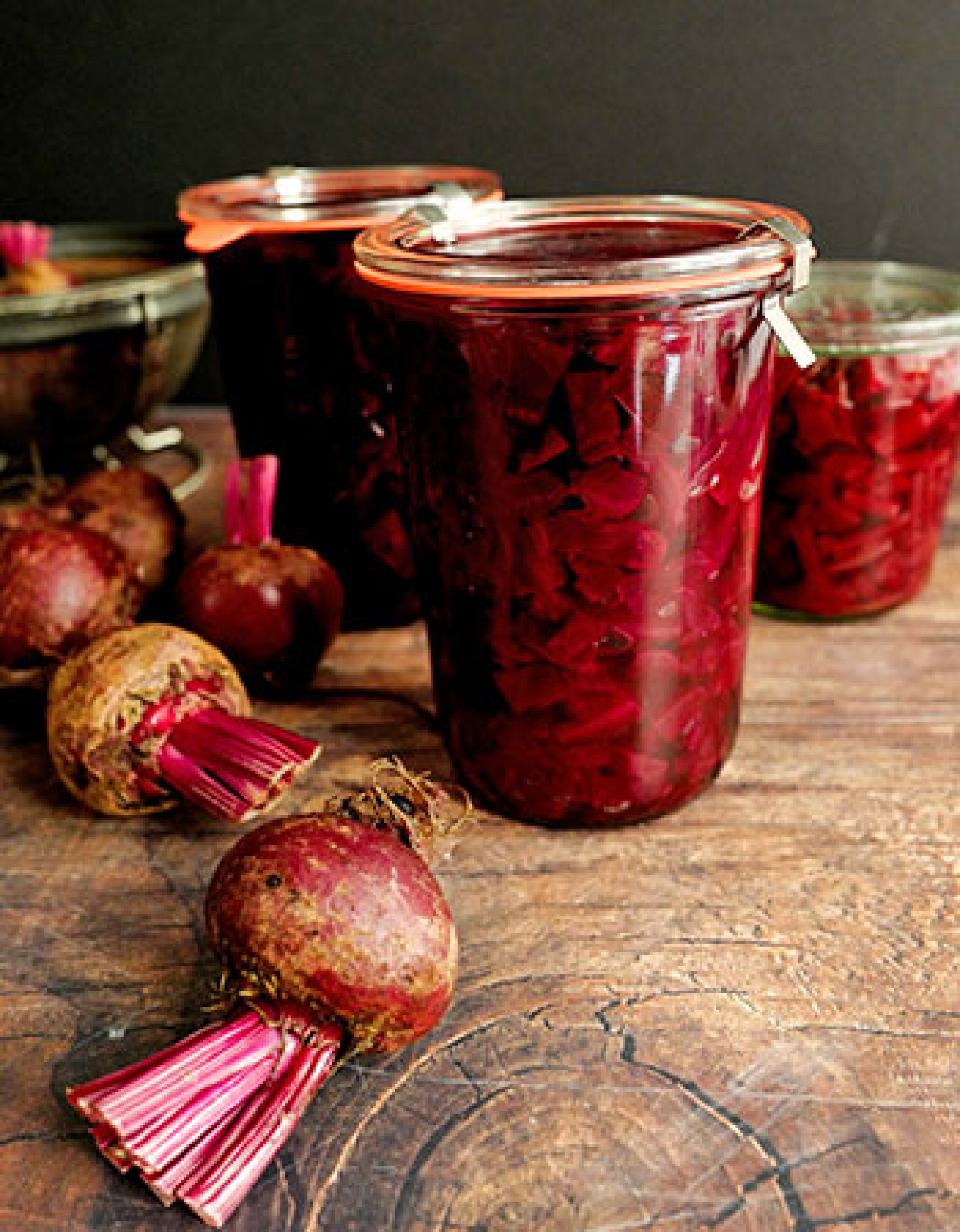
Borshch is far from the only dish elevated by a jar of pickled beets and their stems. Use them instead of regular beets in the iconic Russian holiday salad, Herring Under a Fur Coat. Serve them on top of a roasted beet and goat cheese salad, toss them with rice and salmon in a poke bowl, top a midday snack of cottage cheese with them or spread them on a hamburger as you would relish. I also like to serve a small ramekin of the pickled beets with a cheese and charcuterie board.
I find spending a day putting up pickles and preserves incredibly soothing and satisfying — I love the sense of accomplishment I get from a row of glittering glass jars filled with preserves. But if you are not into the full-blown canning ritual — and many aren’t — you can scale the recipe below back and store the pickles in the fridge for several weeks. Roasting the beets ahead of time makes them delectably velvety-smooth and sweet, and a few traditional and several non-traditional spices give these pickles a robust flavor that is anything but ordinary.
Instant soup will never take root in Russia. But with a jar of these pickled beets, delectable homemade borshch can be yours in an instant.
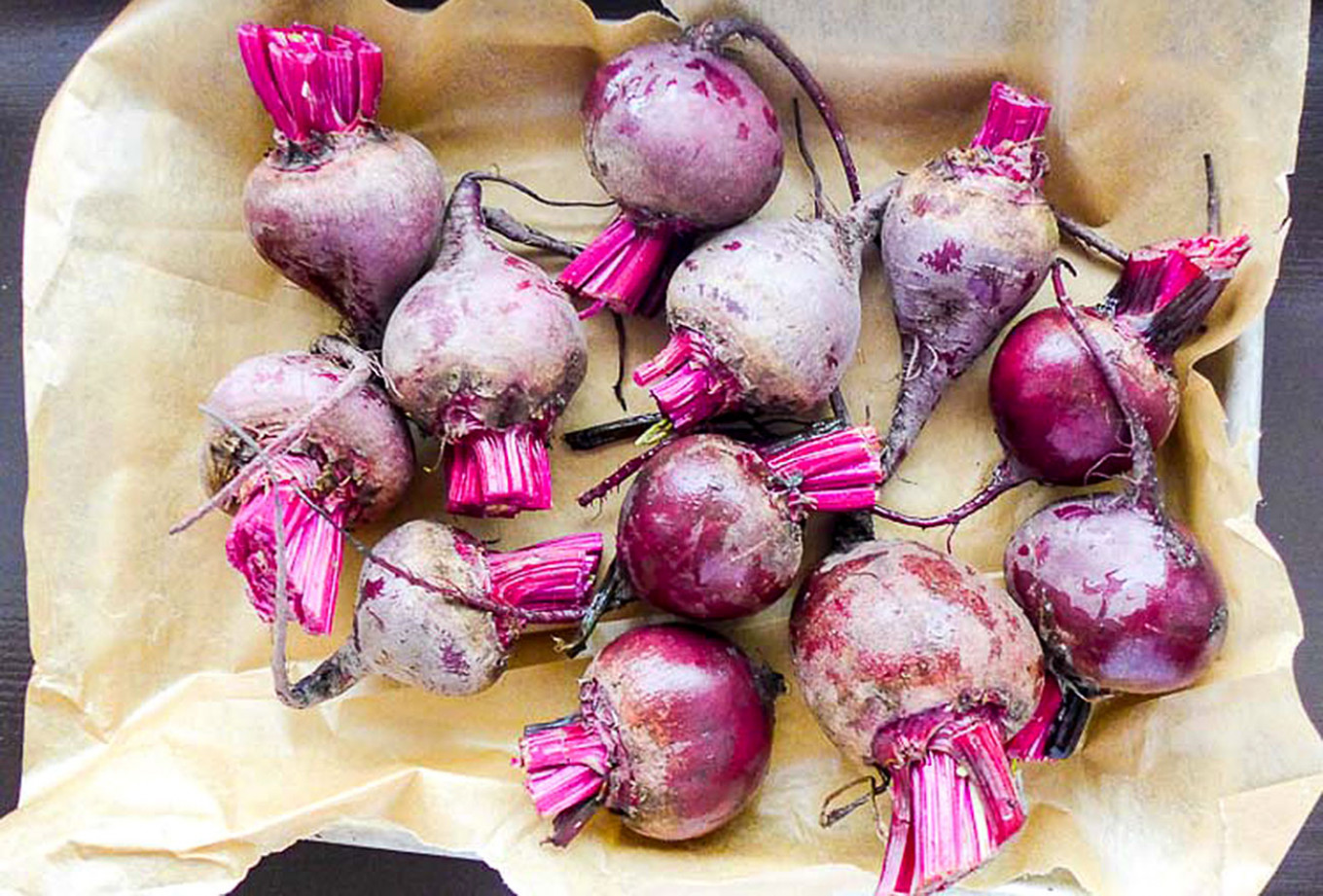
Spicy Pickled Beets and their Stems
Ingredients
- 4-5 bunches of beets and their stems (save the leaves for another purpose)
- 2 quarts (2 liters) of white vinegar
- ½-cup (125 ml) of sugar
- ¼-cup (60 ml) of pickling salt
- 6–9 star anise pods
- 6-9 cinnamon sticks
- 3-6 bay leaves
- ¼-cup (60 ml) of mustard seeds
- ¼-cup (60 ml) of coriander seeds
- 1 head of garlic, cloves thinly sliced
- 2 tsp of hot chili powder
Yield: 3-4 32-oz (1 liter) jars**
Instructions
- Preheat the oven to 450ºF (220ºC).
- Cut the beets from their stems and wrap the beets into a foil pouch.
- Roast the beets for 40 minutes or until the tip of a knife slides into the beet easily.
- While the beets are roasting, prepare the brine. Combine the vinegar, sugar, chili peppers, and salt and bring to a simmer. Stir until the salt and sugar are completely dissolved.
- Toast the mustard seeds, coriander seeds, and juniper berries in a small skillet over medium heat until their odors amplify. Set aside to cool to room temperature, and then roughly crush with a mallet or pestle.
- Prepare the jars by sterilizing the lids and jars in a dishwasher or submerging them in a canning pot of boiling water for 20 minutes.
- When the beets are roasted and have cooled to room temperature, peel and slice them into small cubes.
- Wash the beet stems thoroughly to dislodge any grit, then slice them approximately the same size as the beet cubes.
- Toss the two together with the toasted spices.
- Add a few star anise, cinnamon sticks, bay leaves, and garlic to each jar. Then fill the jars with the beets and their stems, packing them in tightly, and leaving ½-inch headspace.
- Pour the brine over the beets. Use a flat knife to release any air bubbles from the jars.
- Wipe the lips of the jars with a clean damp towel, then affix the lids and process the jars in a canning kettle of boiling water for 15 minutes.
- Set the jars on a towel to cool completely. Store in a cool, dark place. Refrigerate after opening.
**This recipe assumes you will have enough beets and brine for about three to four 32-oz Mason jars. I say about because it will entirely depend on the size of the beets in your bunch. Most bunches contain 4-5 beets. If your beets are on the large side, prepare four to five 32-oz (1 liter) jars or ten 16-oz (500 ml) or pint jars to be safe.
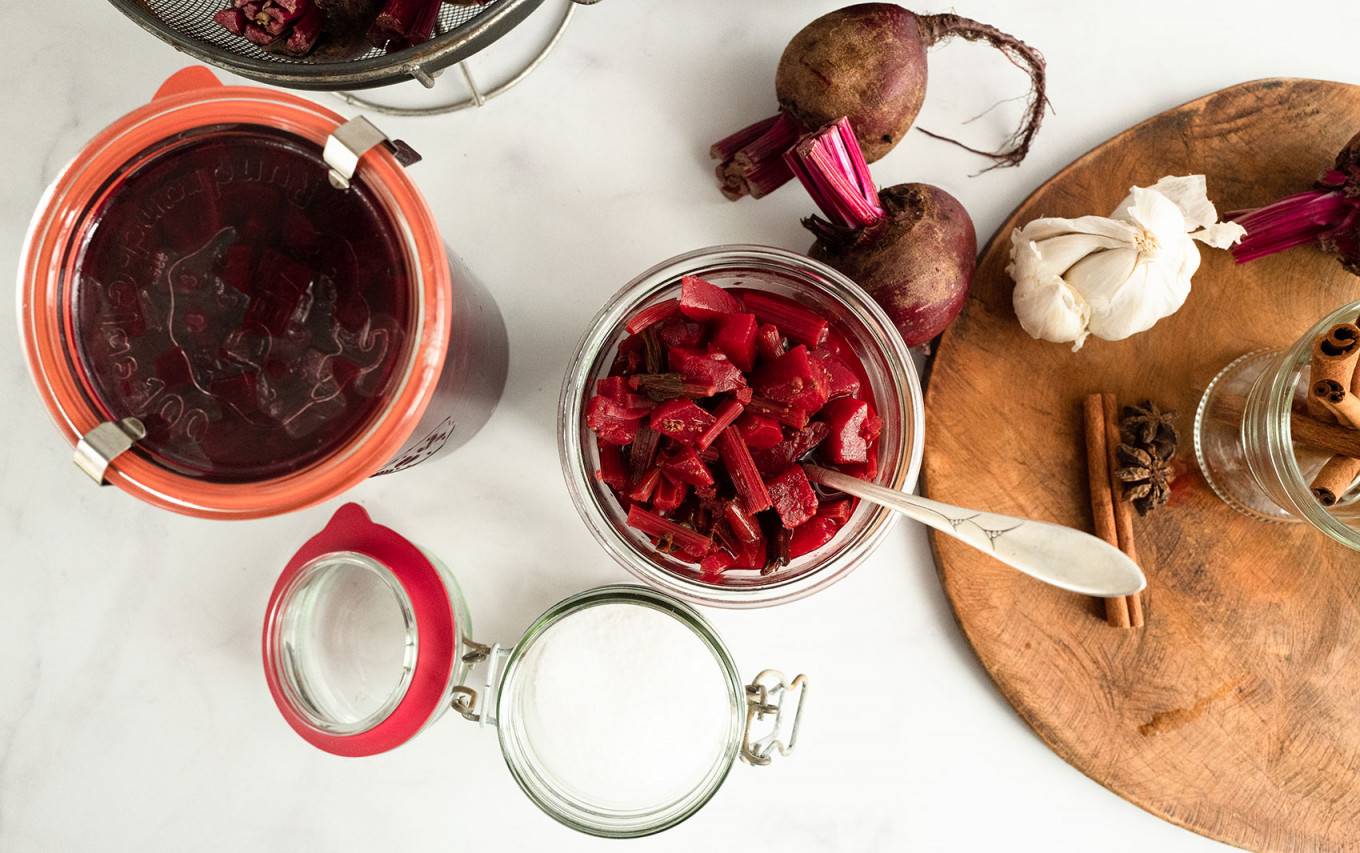
A Message from The Moscow Times:
Dear readers,
We are facing unprecedented challenges. Russia's Prosecutor General's Office has designated The Moscow Times as an "undesirable" organization, criminalizing our work and putting our staff at risk of prosecution. This follows our earlier unjust labeling as a "foreign agent."
These actions are direct attempts to silence independent journalism in Russia. The authorities claim our work "discredits the decisions of the Russian leadership." We see things differently: we strive to provide accurate, unbiased reporting on Russia.
We, the journalists of The Moscow Times, refuse to be silenced. But to continue our work, we need your help.
Your support, no matter how small, makes a world of difference. If you can, please support us monthly starting from just $2. It's quick to set up, and every contribution makes a significant impact.
By supporting The Moscow Times, you're defending open, independent journalism in the face of repression. Thank you for standing with us.
Remind me later.



